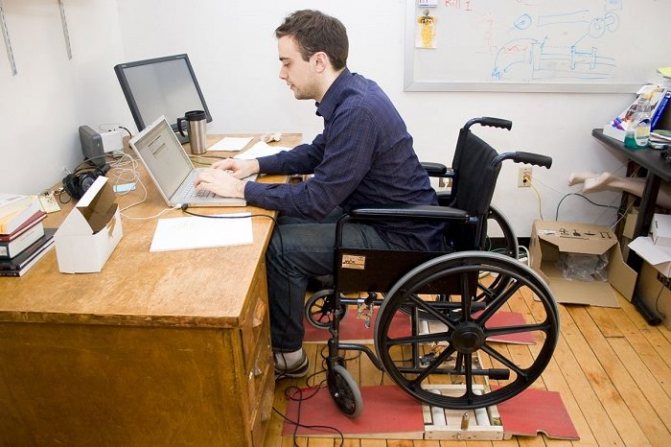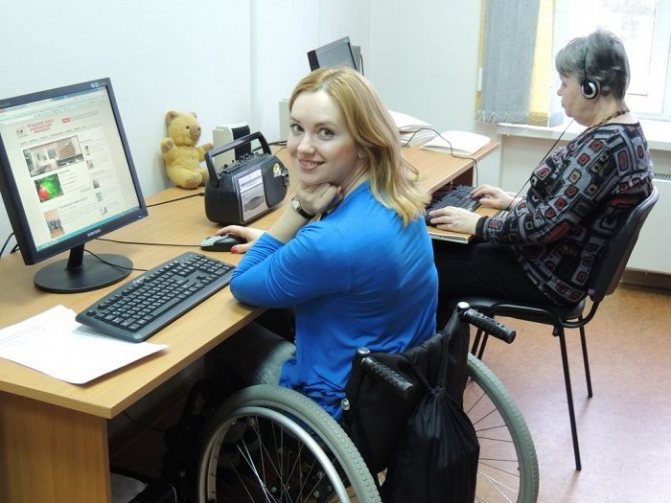Issues discussed in the material:
- What are the features of employment for a disabled person of group 3?
- What law regulates the employment of disabled people of the 3rd group
- How is the employment procedure for people with disabilities of the 3rd group going?
- What benefits are available to disabled people of group 3 when finding employment?
In everyday life, we sometimes meet people with disabilities. Limitations can be associated not only with a person’s physical condition, but also with mental and sensory ones. Depending on the severity of the disease, disability is divided into three groups. Disabled people with the third health group can work if they wish. Employment for them is not only a way to receive money, but also a social activity.
Legislation protects this category of people, including in the field of employment. Of course, not every type of activity is suitable for people with disabilities. Therefore, the state provides various benefits and quotas for them. The employer is faced with the question of how to properly arrange the employment of disabled people of the 3rd group? Does he have the right not to hire a person with disabilities? We will try to answer these and many other questions in our article today.
Does group 3 belong to the working age category?
People become disabled for various reasons. Sometimes this happens at birth, sometimes as a result of health problems that arise later or after an injury. Regardless of the cause of disability, its presence does not deprive a citizen of the right to work. However, the job that a person chooses for himself must correspond to his capabilities, otherwise the employer will be able to refuse him employment.
A disabled person with the third group is not required to work, but the state provides him with employment opportunities.
Limitations related to health status influence the choice of profession. The organization of the workplace and labor functions must correspond to the capabilities of a third group disabled person.
The list of professions available to people with disabilities of the third group is quite extensive. This category of citizens can work, for example:
- teacher;
- doctor;
- accountant;
- advertising agent;
- insurance agent;
- administrator;
- sales manager;
- lawyer;
- archivist;
- architect;
- bartender;
- librarian;
- wardrobe attendant;
- maids;
- duty officer;
- designer;
- by courier;
- painter;
- operator
Employment of disabled people of the 3rd group in positions related to driving can only be carried out with permission from doctors. This category of work is equated to work with hazardous working conditions, so it is not suitable for all disabled people.
Legislative acts regulating the employment of people with disabilities
According to the provisions of the Labor Code of the Russian Federation, disabled people of the third group can work no more than forty hours a week. At the same time, the employer is prohibited from involving such an employee in work beyond the established standards.
The Labor Code of the Russian Federation and a number of federal laws of the Russian Federation contain conditions that the employer must comply with when employing disabled people of the 3rd group. The law, protecting the right of people with disabilities to employment, provides for the allocation of quotas for them. For enterprises with more than one hundred employees, a minimum quota of two percent is established.
The size of the employment quota is influenced by the territorial location of the organization. Often, for different subjects of the Russian Federation, legislation establishes different employment quotas. For example, for Bashkiria, a quota of two percent is provided for firms with more than thirty-six employees.
When determining the size of the employment quota, the total number of employees matters. However, when calculating the quota, workers involved in hazardous and harmful production are not taken into account.
Top 3 articles that will be useful to every manager:
- How to pay insurance premiums
- How to minimize taxes and not interest the tax authorities
- How to fire a chief accountant: nuances of the procedure
Organizations that refuse to employ a disabled person if there are vacancies may face a fine of up to three thousand rubles.
General issues of employment of disabled people are regulated by federal laws No. 143, No. 178 and No. 181, as well as the Labor Code of the Russian Federation.
In addition, in order to create a legal employment relationship with a disabled employee, the employer should familiarize itself with the following regulations:
- Order of the Ministry of Health of the Russian Federation No. 1031-dated November 24, 2010.
- Order of the Ministry of Labor No. 664-n dated September 29, 2014.
These documents address issues such as:
- the total number of working hours for a disabled person during the week;
- establishment of a part-time working week;
- the possibility of involving an employee in overtime work;
- number of days of next vacation;
- availability of additional leave;
- probation.
Types of surcharges
In addition to basic pension payments, disabled people of group 3 can receive such allowances as:
- Monthly allowance in the amount of 1000 rubles - to receive this allowance, you must contact the Pension Fund of the Russian Federation with a corresponding application. To receive this benefit, a disabled person must have unemployed status, which is confirmed by submitting a work book to the Fund.
- Dependents - for one dependent, an additional payment of 32% of the pension amount is made; two dependents – 64; three or more – 100%.
- EDV - these monthly payments are intended for the following categories: war veterans; concentration camp prisoners; persons affected by radiation. The average amount of EDV is 1900 rubles. To appoint an EDV, you need to provide an application, as well as: a passport; SNILS; disability certificate.
- Residents of the Far North - the approximate amount of the allowance is 3,000 rubles. Condition: 20 years of experience.
- Age – when a disabled person is 80 years old, he receives a 100% increase in pension.
- Monetization - if you refuse benefits, a disabled person receives an allowance in the amount of 995 rubles.
It is important to know! Pension of judges in Russia
In addition to basic additional payments, people with disabilities can count on a number of benefits, for example:
- No payment of transport and property taxes.
- 50% discount on medications.
- Discounts on utility bills.
- Involvement in overtime work only with the consent of the disabled person.
- Preferential travel on public transport.
- A trip to the sanatorium-resort complex.
- Out of line service.
- Providing vacation at any convenient time.
- No probationary period for employment.
- Receiving free social services (cleaning, purchasing food, legal assistance, etc.).
The list of benefits is established separately in each region of the country.
Non-work and work diseases for group 3

The third disability group is usually assigned to persons with diseases such as asthma, oncology, and arthritis. In addition, disability is provided for people who have:
- significant flaws in appearance;
- speech disorders;
- problems with blood circulation;
- mental disorders;
- dysfunction of the sensory organs.
Important! When establishing disability of the third group, an important point is the stability of the existing dysfunctions of the human body.
Personnel accounting. Why does business need HR records?
The daily activities of citizens with disabilities in group 3 do not depend on third parties. In other words, they are able to independently take care of themselves in everyday life. They have no problem with actions such as:
- taking a shower;
- management of natural needs;
- movement and orientation in space;
- self-cooking;
- communication.
At the legislative level, there is no division of diseases into work and non-work diseases. However, the degree of the disease determines the presence of some restrictions:
- The first degree allows an employee to perform work duties in an equipped specialized workplace, provided that the employer can organize it in accordance with the nature of the work.
- The second degree means that the employee can work exclusively in a specially equipped workplace.
- Having a third degree does not allow a disabled person to work.
Rights of group 3 disabled people at work
The legislation of the Russian Federation protects the rights of people with disabilities and promotes their employment. Thus, according to Federal Law, in organizations with more than a hundred employees, at least two (2%) must be disabled. Special quotas make it possible to eliminate discrimination against persons with disabilities and provide them with favorable conditions for earning money and developing a career.
As with other employees, an employment contract is concluded with a disabled person, which specifies working and rest conditions. There are a number of differences in the employment process, as well as in the benefits provided to persons with disabilities.
The employer is obliged to provide the disabled person with working conditions that will take into account his individual rehabilitation program (hereinafter referred to as IPR). It is compiled by an expert medical commission when registering disability. An employee with a disability may refuse to provide the program by showing only a certificate of disability status upon employment. In this case, the employer is released from the obligation to provide conditions for IPR to the disabled person.
Fact: If an employer refuses employment to a group three disabled person without a good reason, he is obliged to pay a fine of 2 to 3 thousand rubles.
A person with a disability has the right not to provide documents that confirm his state of health (unless the scope of activity provides otherwise, as in the case of public service). If the employer was not warned about the disabled person’s condition, then the employment contract is concluded on standard terms. A disabled person is deprived of special privileges and works on an equal basis with other employees.

Registration of disability for employment
When applying for employment, disabled people of the third group provide the employer, in addition to the standard package of documents, with a medical certificate indicating the group and IPR.
To obtain the appropriate certificate, you must undergo a medical and social examination. The design algorithm is as follows:
- Make an appointment with your doctor.
- Request a referral for a medical and social examination based on existing health problems.
- Pass MSE in a hospital setting.
To pass the ITU successfully, it is important to collect a package of necessary documents. It consists of the following papers:
- passport and copies of its pages;
- a copy of the work book, officially certified;
- referral for examination from the attending physician;
- characteristics from the place of employment or study;
- outpatient card;
- an application requesting conditions for undergoing an examination;
- a document confirming the presence of an occupational disease or injury (if the condition is caused by work activity).

During the examination, a decision will be made on whether to grant disability status. If it turns out to be positive, specialists must also indicate the estimated timing of such a condition, its causes, and determine restrictive and restorative measures. The degree of need for social protection is also established.
Advice: If there is an unreasonable refusal to issue a disability certificate, you must contact the ITU Bureau by filing a complaint in writing.
After completing the medical report, it must be brought to the boss along with the IPR, passport and job application. Men additionally provide a military ID. If a group 3 restriction was received after employment, the employee can also contact the employer to obtain special conditions. An additional written agreement is drawn up and attached to the initial employment contract with the disabled person.
Disability criteria
The third disability group includes people who meet certain criteria. The list is updated regularly. For 2021 it includes the following:
- the ability to navigate only in a familiar area;
- fractional receipt of information or slowdown in speech activity;
- the ability to perform work duties under standard conditions while reducing the burden on health and mental health;
- periodic loss of self-control in the presence of psychological pressure;
- slow movement or using special means of movement;
- the ability to perform self-care, but for a longer duration or with the help of additional means;
- the opportunity to undergo training in specially equipped institutions for people with disabilities.
If a person meets one or more criteria from this list, based on the results of the commission, he is assigned the appropriate group.

How to establish the 3rd disability group

Disability of the third group is assigned to an individual after a medical and social examination (MSE).
The following have the right to send a person for examination:
- local therapist;
- employees of agencies for assistance and protection of persons with disabilities;
- employees of the Pension Fund of the Russian Federation;
- judicial authorities.
The documentation required to conduct an ITU includes:
- statement;
- referral to ITU;
- medical documents;
- work book.
After carefully studying all the documents provided by the patient and conducting an examination, doctors either assign the person a disability or make a decision to refuse to establish it. The decision is made as a result of a vote between all members of the medical commission.
When assigning a disability to a person, doctors also decide on its duration. The third group is assigned either for one year or for life.
The Ministry of Labor, by order No. 1024, regulates the conditions for conducting MSE. In particular, the document covers issues such as:
- Algorithm for passing the ITU.
- List of documents.
- Availability of specialized equipment.
- Deadlines for assigning disability.
- Possibility to challenge ITU results.
- List of health disorders that are the basis for assigning a disability category.
In addition to the fact of assignment of disability, the ITU conclusion provides for an indication of the degree of illness, which is of great importance for employment.
In addition, the document may contain special provisions that can affect the choice of activity and working conditions of a disabled person.
- Is it possible to challenge the ITU's decision?
A citizen who does not agree with the decision of the commission has the right to contact the ITU Bureau and appeal it. A period of one month is allotted for consideration of the complaint.After this time, a decision is made either to order a re-examination or to confirm the results of the previous ITU.
The results of the re-examination can also be challenged by the patient.
To do this, he needs to contact the main bureau. The procedure for considering a complaint in this case will be similar to the previous one. After the expiration of the thirty-day period, a decision will be made.
In order to challenge this decision, the disabled person will have to contact the judicial authorities.
- Is it possible to reclassify a group?
The answer to this question is yes. A person has the right to reclassify the group assigned to him.He can do this either during the next ITU, or after appealing the previous results.
Repeated ITU, the purpose of which is to requalify the group, can be carried out only after collecting the full package of documents again.
- Will there be a reduction in pensions and daily allowance while working?
No, it will not.The employment of disabled people of the 3rd group in 2021 is not a basis for reducing their pension. Moreover, it can be increased by insurance premiums paid by the employer.
The amount of compensation payments does not change in any way when a third group disabled person is employed.
Registration procedure
To receive payments, a disabled citizen must:
Get a full examination
The first action of a potential disabled person is to visit a clinic, namely, make an appointment with a local therapist. The doctor is obliged to issue a bypass sheet, on the basis of which the citizen goes through all the necessary doctors and takes tests.
After this, the patient returns to the doctor and submits the results of the examination. Within two weeks, the therapist studies the received documents and then prepares a referral for further commission examination.
It is important to know! IPC and how is it related to the assignment of a pension?
Receive the official title of disabled person
Group assignment is carried out at the ITU office.
You must submit to this bureau:
- medical direction;
- medical card;
- passport;
- statement;
- employment history;
- income document;
- examination results;
- characteristics from work.
The bureau carries out the following actions:
- Setting up a group.
- Checking documentation.
- Consideration of the cause of disability.
- Determining the duration of disability.
- Studying the psychological data of a citizen.
- Consideration of social and housing conditions.
- General assessment of the applicant's condition.
After ITU completes these actions, bureau employees draw up an act recognizing (or not recognizing) the citizen as disabled.
Prepare documentation
After assigning a third or another group, the citizen is obliged to prepare documents for the Pension Fund, which include:
- passport details;
- ITU act;
- employment history;
- application - sample can be downloaded from the link;
- certificate of average salary;
- SNILS;
- documents on change of name;
- certificate of residence;
- documentation of dependents.
Contact the Pension Fund
The disabled person submits the entire package of documentation to the territorial branch of the Pension Fund. If a citizen cannot personally contact the Fund, then an official authorized representative has the right to hand over the documents.
The period for reviewing documents is 30 days. The time allowed for making corrections is 3 months from the date of filing the application.
There are the following ways to receive payments:
- Mail – with personal delivery or.
- Bank card.
- Confidant.
- Organizations involved in the delivery of pension contributions - a complete list is available on the website https://www.pfrf.ru/.
After the expiration of the ITU act, the disabled person undergoes re-examination to extend payments.
Employment of disabled people of the 3rd group

Let's look at how the employment of a disabled person of the 3rd group occurs. Features of hiring are determined by the need to provide an expanded package of documents.
In addition to the standard documentation required for employment, the candidate provides:
- Conclusion of the examination.
- A rehabilitation program, which is necessary for organizing a specialized workplace.
A candidate has the right not to inform the employer about his disability during employment, provided that the vacant position does not require a mandatory medical examination. In this case, his working conditions will be the same as those of healthy employees.
Establishing a probationary period when employing a disabled person is unlawful. It should be noted that the employer has the right to refuse employment to a disabled person for reasons unrelated to his state of health.
Federal Law No. 181 is a document regulating the employment of disabled people of the 3rd group. According to this act, the following benefits are provided to disabled employees of the third group:
- No trial period.
- The length of the working week cannot exceed forty hours, and the amount of wages does not change.
- The period of paid leave cannot last less than thirty days.
- The employee has the right to take additional unpaid leave, the duration of which is at least thirty days.
- Based on the results of the ITU, the employee may be assigned a shortened work week.
- An employer does not have the right to involve an employee with a third group disability in overtime work.
Pension amount
The average size of 3GI payments is 8,500 rubles. The amount of payments cannot be lower than the subsistence level (living wage).
It is important to know! Child's disability pension
There are three types of pensions, namely:
- Insurance
If there is an insurance period, a disabled person receives a pension based on insurance contributions and salary level. The average size of this part is 2300 rubles.
- State (basic) - equal to 5,400 rubles.
- Social
The amount of social payments for 3GI is 4,300 rubles. The specified amount is calculated if a citizen over 18 years of age does not have the minimum length of service.
Payments are also subject to annual indexation. In 2021, indexation is planned by 4%.
Read more about indexing in our material here.
The amount of payments increases if: the disabled person lived and worked in the Far North for a long time; presence of dependents!









